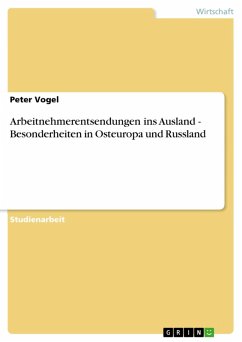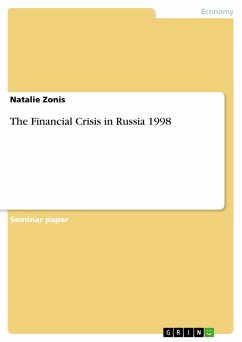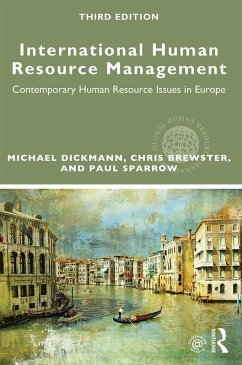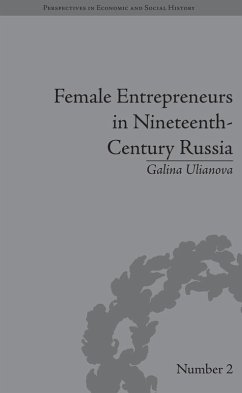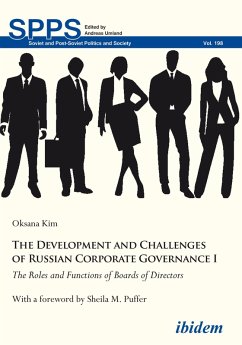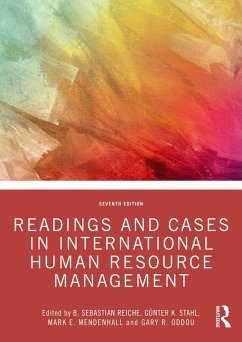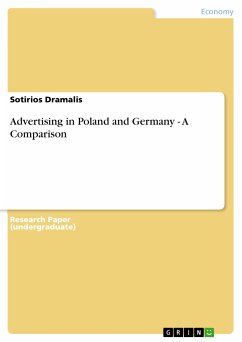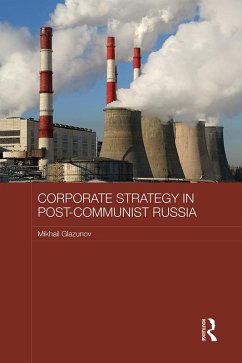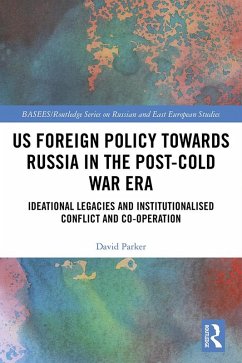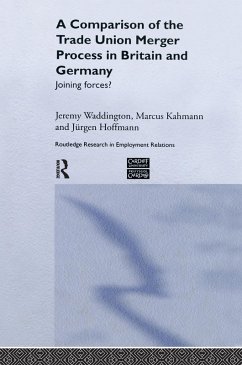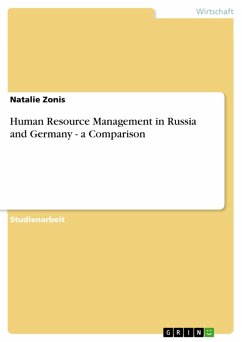
Human Resource Management in Russia and Germany - a Comparison (eBook, ePUB)
Sofort per Download lieferbar
Statt: 18,95 €**
15,99 €
inkl. MwSt. und vom Verlag festgesetzt.
**Preis der gedruckten Ausgabe (Broschiertes Buch)
Alle Infos zum eBook verschenkenWeitere Ausgaben:

PAYBACK Punkte
0 °P sammeln!
Studienarbeit aus dem Jahr 2011 im Fachbereich BWL - Unternehmensführung, Management, Organisation, Note: 1,7, FOM Hochschule für Oekonomie & Management gemeinnützige GmbH, Berlin früher Fachhochschule (International Management), Sprache: Deutsch, Abstract: Russia's unique, very dynamic and complex business environment has not only caused great business prospects but also some difficult, painful upheaval. Therefore many Western entrepreneurs still associate risk rather than opportunity with Russia. But nevertheless, Russia still remains the world's largest country in terms of territory spa...
Studienarbeit aus dem Jahr 2011 im Fachbereich BWL - Unternehmensführung, Management, Organisation, Note: 1,7, FOM Hochschule für Oekonomie & Management gemeinnützige GmbH, Berlin früher Fachhochschule (International Management), Sprache: Deutsch, Abstract: Russia's unique, very dynamic and complex business environment has not only caused great business prospects but also some difficult, painful upheaval. Therefore many Western entrepreneurs still associate risk rather than opportunity with Russia. But nevertheless, Russia still remains the world's largest country in terms of territory spanning nine time zones with a population of over 140 million people. Such massive changes as the liberalization and rapid growth of the Russian economy, its substantial growth in purchasing power and a relative lack of competition in some sectors make that challenging environment an attractive destination for foreign investment - especially for the German. Since 1997 Germany remains Russia's most important trade partner worldwide. Russia's exports to Germany went up to 30 Billion Euros in 2006 and 28.8 in 2007. But for the German companies Russian market is not less important - in 2007 the exports to Russia have had an impressing value of 28.2 Billion Euros which has increased to 20.6% from the year before. It must be noted however, that Russia's traditional exchange of goods with its Western partners mainly sustains of the export of its raw materials (energy) and the import of manufactured goods. Anyway, the close link and the growing dependency of both countries over the years become more and more evident. And both trade partners are considered as quite compatible as it can shortly be described by: "The German Market can deliver whatever the Russian Market desires". But these business engagement opportunities now appear in an environment significantly different from the German investor's habitual home culture - and culture is a crucial factor of human resource management. The essential knowledge of the institutional, managerial and contextual nuances is the key-factor for an effective management of human resources and successful formation of multinational enterprises. This term paper provides the main aspects of HRM in Russia and Germany and an overview about the cultural context in which human resource management takes place. Further on it examines the key human resource issues and concerns of businesses operating in this transitional environment. Moreover, some of Russia's HR specifics are analyzed and the most effective tools are presented for how to overcome the difficulties and how to succeed in doing business in Russia.
Dieser Download kann aus rechtlichen Gründen nur mit Rechnungsadresse in A, B, BG, CY, CZ, D, DK, EW, E, FIN, F, GR, HR, H, IRL, I, LT, L, LR, M, NL, PL, P, R, S, SLO, SK ausgeliefert werden.




